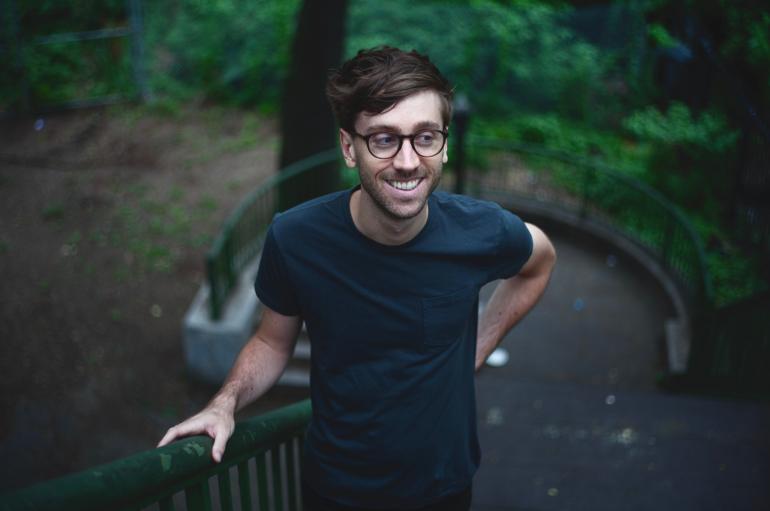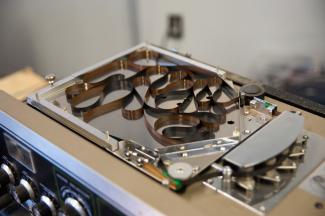
David Bird joined the faculty of the University of Chicago Department of Music as Visiting Assistant Professor in Music at the beginning of this academic year. He is a composer, producer, and multimedia artist whose work explores the dramatic potential of electroacoustic and multimedia environments, often highlighting the relationships between technology and the individual.
Learn all about David Bird below, and read his thoughts on this year's CHIMEFest, what the best candle scents are, and his relationship with technology as it relates to joy.
As the Director of the CHIME Studio, you’ve been integral to planning this year’s CHIMEFest. What are you most looking forward to?
It's been a wonderful opportunity to curate this year's festival and highlight so many talented artists and varied practices in electronic music. The festival is centered around three programs of works for soloists and electronics, featuring performances by Dana Jessen, Liz Pearse, and Ning Yu, all tremendous performers and interpreters of contemporary music. Many of the works featured in the festival will take advantage of an eight-channel speaker array that will envelop the performers and audience members. It will be fascinating to see the ways that artists take advantage of this setup. This year I wanted to place a particular emphasis on University of Chicago composers to situate their work amidst different historic or international practices in electronic music. I'm especially looking forward to hearing new works (or reinterpretations of preexisting works) by University of Chicago composers Hunter Brown, Jack Cramer, Ryan Garvey, Darlene Castro Ortiz, Andrew Stock, Kari Watson, and Ania Vu (featuring Eduard Teregulov).
Can you talk about the meaning behind this year’s CHIMEFest title, "Site/Space?"
Space has been a persistent theme in my work and something I often reflect on when listening to music. I'm continuously fascinated by the ways that artists incorporate spatial concepts into their work, whether conceptually, technically, or poetically, and I wanted to curate a festival with those creative practices in mind. I’m also currently teaching a graduate music seminar this quarter entitled "Composing for Spatial Audio," which I thought would overlap nicely with the festival and provide students with hands-on experience composing for multichannel speaker arrays.
Some of the earliest pieces in my compositional catalog explore spatial concepts, whether it be acoustical effects, performers situated at vast distances, or performances in site-specific locations. In my electroacoustic work, many of my pieces explore the spatialization and diffusion of electronic sound in multichannel speaker setups. Last year I held a research residency at ZKM in Karlsruhe, Germany, where I developed computer software that would spatialize the electronic elements created for my latest album, Iron Orchid, a work for piano and electronics created in collaboration with pianist Ning Yu. That software took advantage of ZKM's 48-channel speaker dome, distributing the prerecorded electronic sounds of the album throughout the space while accompanying Ning Yu's live performance. We will hear this in a reduced version (for eight channels) during Ning Yu's CHIMEFest program on February 4th.
See the full schedule of CHIMEFest events on the CCCC website.
You describe yourself as a candle enthusiast. Top 3 candle scents? Worst candle scent?
I do describe myself as a candle enthusiast, I frequent the Target candle aisle, I'm actively seeking candle sponsorships, et cetera. There was a period of time where I had to light a candle before composing. I thought it did something to harness or focus creativity, but it turned into an expensive hobby. Top scents come and go, but tonka, bergamot, and sage are consistent favorites of mine. There's an endless supply of terrible candles and candle scents; I usually stay away from seasonal candles, vanilla, or citrus-scented candles. Kaija Saariaho gave me a candle once. It's never been lit, but I always wonder what magical forms of music it would inspire.
What is a recent technological innovation that brings you joy?
That's a great question. It's almost uncommon to think about technological innovation as it relates to joy, as so much writing on technological advancement is quite skeptical (for good reason) or focused on its unintended consequences, whether they be privacy-related, environmental, or social. As someone who almost always writes music with technology as a central feature, the characterization of technology is important to me, and I've spent a great deal of my work exploring critical and even dystopian aspects of technology through music and rarely the joyous parts.

While it's not a recent technological innovation, when I think about technology and joy, recording technology, particularly magnetic tape, is one of the first things that comes to mind. The ability to record, listen, reflect, and adapt has influenced musical and compositional practices in a tremendous way, and I find it hard to imagine a life as a composer or musician without having that reflective technology present. One of my most cherished pieces of musical equipment is a Roland Space Echo, a famous analog tape delay. You can open up the top of the device and watch the tape loop twist, bend, and loop through the aged mechanism. The artifacts of that mechanical transit are printed on the resulting sound. It's a technology that allows you to relive a moment while also being surprised by it at the same time.
Learn more about David Bird and listen to his works on his website.
